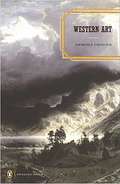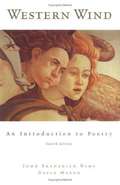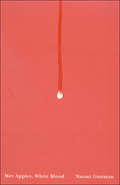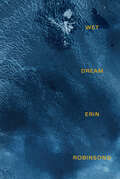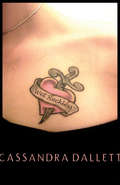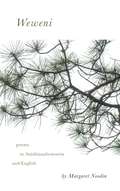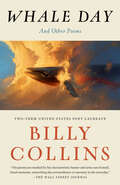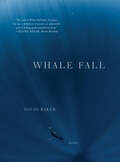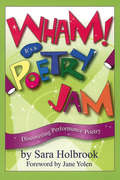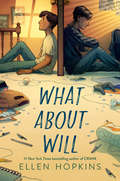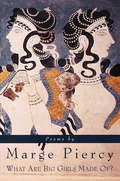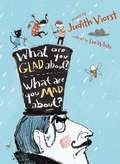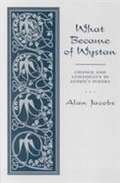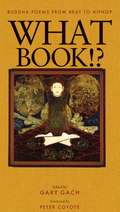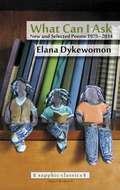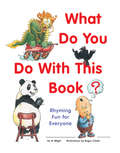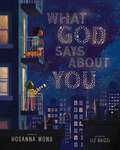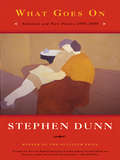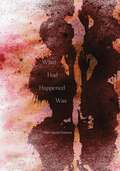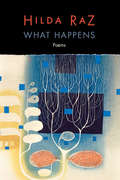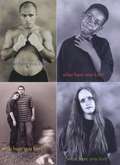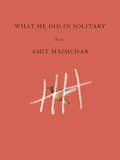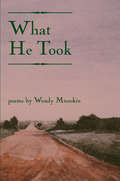- Table View
- List View
Western Art
by Debora GregerIn her seventh book of poetry, Debora Greger walks out of art history class and into Europe, even to the edge of Asia. A night wedding in Venice, an encounter with a girl on an aqueduct in Istanbul, a walk into the emptiness of the Florida prairie, standing before a Rembrant or a tomb in Ravenna-these portraits of travel reveal a poet never at home even when home. Debora Greger's poems love the accident of discovery; she is a poet whose intimacies are expressed in whispers, whose secrets come in sidelong glances.
Western Wind: An Introduction To Poetry
by David Mason John Frederick NimsThis collection of classic and contemporary poems also includes exercises, chapter summaries, games, diagrams, illustrations, and 4-colour reproductions of great works of art. This edition incorporates many new poets and expanded coverage of women and ethnic poets.
Western Wind: An Introduction to Poetry (4th Edition)
by David Mason John Frederick NimsWESTERN WIND teaches by example and provides an outstanding collection of classic and contemporary poems. The text also includes exercises, chapter summaries, games, diagrams, illustrations, and 4-color reproductions of great works of art.
Wet Apples, White Blood
by Naomi GuttmanNaomi Guttman's new poetry collection was inspired by the role of nursing in human evolution and culture. The first cycle of poems, "Wet Apples, White Blood," offers lyric glimpses into archetypes of breastfeeding women in history and myth. The dramatic action in the second cycle, "Galactopoesis," centers around the experience of a mother whose young child is hospitalized. Galactopoesis is the medical term for the continued secretion and production of milk. It derives from the Greek radicals for 'milk' (galacto) and 'making' (poesis), which is also 'poetry.' In Wet Apples, White Blood, nursing, as a constant creative act dependent on the baby's demand, is a trope for the creative process and for questions of biology, psychology, and spirituality.
Wet Dream
by Erin RobinsongWet Dream is an expansive, erotic, and enlivening book of ecological thinking. Wet Dream is an expansive book of ecological thinking for living on a wet planet on fire. Erotic and political, vibrating with pleasures, medicines, and unrest, these poems metabolize toxic logics and traverse enmeshed ecologies through the wetness that connects. A pulse of agency to the heart. "Wet Dream is brain lube for an insurgent language—creaturely poems that remake your body and relation to the world. I want to smear them all over." — Astrida Neimanis, author of Bodies of Water: Posthuman Feminist Phenomenology
Wet Reckless
by Cassandra DallettIn this poetic memoir of a rough and tumble life, from her backwoods childhood without boundaries to a California urban adulthood filled with triumphs and disasters, Cassandra Dallett spares no details in a poetry memoir that reads like the love child of Charles Bukowski and Elizabeth Bishop. These are stories of an outsider, a perpetual misfit, offering a ceasefire in the war she wages with herself.Cassandra Dallett's work has appeared in Slip Stream, Sparkle and Blink, Rusty Truck, Hip Mama, and the Criminal Class Review, among other publications. She currently occupies Oakland, California.
Weweni (Made in Michigan Writers Series)
by Margaret NoodinDepending on dialect, the Anishinaabemowin word "weweni" expresses thanks, exactitude, ease, and sincerity. In addition, the word for "relatives" is "nindenwemaaganag": those whose "enewewe," or voices, sound familiar. In Weweni, poet Margaret Noodin brings all of these meanings to bear in a unique bilingual collection. Noodin's warm and perceptive poems were written first in the Modern Anishinaabemowin double-vowel orthography and appear translated on facing pages in English. From planetary tracking to political contrasts, stories of ghosts, and messages of trees, the poems in Weweni use many images to speak to the interconnectedness of relationships, moments of difficulty and joy, and dreams and cautions for the future. As poems move from Anishinaabemowin to English, the challenge of translation offers multiple levels of meaning--English meanings found in Anishinaabe words long as rivers and knotted like nets, English approximations that bend the dominant language in new directions, and sets of signs and ideas unable to move from one language to another. In addition to the individual dialogues played out beween Noodin's poems, the collection as a whole demonstrates a fruitful and respectful dialogue between languages and cultures. Noodin's poems will be proof to students and speakers of Anishinaabemowin that the language can be a vital space for modern expression and, for those new to the language, a lyric invitation to further exploration. Anyone interested in poetry or linguistics will enjoy this one-of-a-kind volume.
Whale Day: And Other Poems
by Billy CollinsA wondrous collection from Billy Collins, former U.S. Poet Laureate and New York Times bestselling author of The Rain in Portugal &“The poems are marked by his characteristic humor and arise out of small, banal moments, unearthing the extraordinary or uncanny in the everyday.&”—The Wall Street JournalWhale Day brings together more than fifty poems and showcases the deft mixing of the playful and the serious that has made Billy Collins one of our country&’s most celebrated and widely read poets. Here are poems that leap with whimsy and imagination, yet stay grounded in the familiar, common things of everyday experience. Collins takes us for a walk with an impossibly ancient dog, discovers the original way to eat a banana, meets an Irish spider, and even invites us to his own funeral. Sensitive to the wonders of being alive as well as the thrill of mortality, Whale Day builds on and amplifies Collins&’s reputation as one of America&’s most interesting and durable poets.
Whale Fall: Poems
by David Baker“The craft of Whale Fall defies. It asserts, for me, a definition of poetry: an unbearable gulf of feeling made indelible by form.”—Diane Seuss, Paris Review A masterful and moving new volume from a “peerless poet of the natural world” (New York Times Book Review). Acclaimed as an essential voice of the American Midwest, David Baker expands both his environment and his form in his eleventh collection. Whale Fall is about time, measured in the wingbeats of a hummingbird or the epochs of geological change, and about place, whether a backyard in Ohio or the slopes of a melting glacier. In the exquisite, musical title poem, a deft hybrid of eco-poetic alarm and intimate narrative, Baker transports us to the deep sea as a single gray whale carcass falls, decays, and is reinhabited by a cosmos of teeming lives. Among the strands of ocean health, microplastics, and related calamities of human disregard, the poet weaves in a personal story of chronic illness. The result is a stirring, confident work, astonishing in its emotional acuity and lyric range. Each poem in Whale Fall is an echolocation, emitting its music to situate itself among others in the vastness of the world. Amidst climate change and catastrophe, as amidst a blooming viburnum or a viral disease, these poems send their songs across empty spaces of a line, a page, or a continent, to see who is out there, moving in the depths of being.
Wham! It's a Poetry Jam: Discovering Performance Poetry
by Sara HolbrookTake a wild ride with poet Sara Holbrook as she guides young writers in performing their poetry with style and pizzazz. With enthusiasm and a touch of irreverence, Ms. Holbrook, a performance poet herself, explains how to use voice, rhythm, attitude, movement, and other techniques to perform poetry in a group, duo, or solo. More than thirty poems are included for young readers to practice, as well as instructions for putting on a poetry jam at school or in the community.
What About Will
by Ellen HopkinsFrom #1 New York Times bestselling author Ellen Hopkins comes a new heartbreakingly tender middle grade novel-in-verse about the bonds between two brothers and the love they share.Twelve-year-old Trace Reynolds has always looked up to his brother, mostly because Will, who's five years older, has never looked down on him. It was Will who taught Trace to ride a bike, would watch sports on TV with him, and cheer him on at Little League. But when Will was knocked out cold during a football game, resulting in a brain injury--everything changed. Now, seventeen months later, their family is still living under the weight of "the incident," that left Will with a facial tic, depression, and an anger he cannot always control, culminating in their parents' divorce. Afraid of further fracturing his family, Trace begins to cover for Will who, struggling with addiction to pain medication, becomes someone Trace doesn&’t recognize. But when the brother he loves so much becomes more and more withdrawn, and escalates to stealing money and ditching school, Trace realizes some secrets cannot be kept if we ever hope to heal.
What Are Big Girls Made Of?
by Marge PiercyOpening with a powerful cycle of elegies for her long-distant, half-brother, this major new collection by one of our bestselling poets then goes on to include both serious and funny poems about women and poems about the precarious balance of nature, ending with the beautiful, life-affirming "The Art of Blessing the Day." 160 pp.
What Are You Glad About What Are You Mad About: Poems for When a Person Needs a Poem,
by Judith ViorstFrom school to family to friends, from Grrrr to Hooray!, Judith Viorst takes us on a tour of feelings of all kinds in this thoughtful, funny, and charming collection of poetry that's perfect for young readers just learning to sort out their own emotions.
What Became of Wystan: Change and Continuity in Auden's Poetry
by Alan JacobsIn this lucid and balanced treatise, Alan Jacobs reveals the true parameters of Auden's change after his move to America in 1939. By carefully examining poems that represent transitional moments in Auden's thinking, he demonstrates the steady qualities of thought and expression found throughout Auden's poetry and shows how, in great art, as in great minds, change and continuity may powerfully coexist.
What Book!?
by Peter Coyote Gary GachWhat Book!? is a lively anthology of modern mindful poetry, featuring 330 selections from 125 contributors. Also included are "mind-writing exercises" by Allen Ginsberg and a meditation by Thich Nhat Hanh.Themes include love, nature, pacifism and violence, the avant-garde, family, silence, and song. The contents include original work and translations; performance art and conceptual art; lyrics, arias, and blues; picture poems and calligraphy; prose poetry and sonnets; haiku; meditations and sutras; journal entries; bucolics; jeremiads; postmodernism; and other artifacts from the intersection of meditation and art.Its rich tapestry of voices includes Peter Coyote, Maxine Hong Kingston, Yoko Ono, Czeslaw Milosz, Robinson Jeffers, Yusef Komunyakaa, Lawson Inada, Allen Ginsberg, Jack Kerouac, Lawrence Ferlinghetti, Laurie Anderson, John Cage, Thomas Merton, Robert Aitken, Norman Fischer, Gary Snyder, Diane de Prima, Mary Oliver, Stephen Mitchell, bell hooks, Adam Yauch, brand-new discoveries, and children of all ages.
What Book!?: Buddha Poems from Beat to Hiphop
by Gary GachWith poems from spiritual teachers to jazz musicians, from the monastery to the street, What Book!? brings together a boad range of verse, expressions of living in an awakened way. " A poet once located poetry as somewhere before or after words take place. Mindfulness is the practice of finding that realm, dwelling there, and cultivating the ability to live completely in the present, deeply aware and appreciative of life." - from the author's Preface. "This enigmatically titled anthology offers numerous delights and valuable evidence that great poetic variety, from haiku and witty two liners to page-long discourses, has by now given distinct expression to Western Buddhism." - Publisher's Weekly.
What Can I Ask: New and Selected Poems 1975-2014 (Sapphic Classic)
by Elana DykewomonDrawing on Dykewomon's impressive body of poetry, What Can I Ask: New and Selected Poems 1975-2015 assembles into a single volume poems from Dykewomon's three published collections, They Will Know Me By My Teeth (Megaera Press, 1976), Fragments from Lesbos (Diaspora Distribution, 1981), and Nothing Will Be As Sweet as the Taste (Onlywomen Press, 1995), as well as a selection of newer, uncollected poems. Dykewomon continues asking questions and reaching for answers, demonstrating the power of poetry to comfort and enrage, inspire and arouse.
What Do You Do With This Book?: Rhyming Fun for Everyone
by Roger Clarke Al WightThis classic rhyming book for features fun illustrations and simple rhymes that children and parents will love.What Do You Do With This Book? is a charming and witty children's book that is meant to be read by parents to their young children, to stimulate the child's interest in books and reading. <P><P>Through this story, children are encouraged to learn new words by relating common household items to one another. The beautiful illustrations will help to captivate the children's interest and further develop their inherent interest in rhyming.
What God Says About You
by Hosanna WongWhen a child feels left out, makes a mistake, or is called a name that hurts their heart, how can they know their true identity? Bestselling author, spoken-word artist, and thought leader on identity Hosanna Wong reveals that you aren&’t defined by what you&’ve done or what others think—you&’re defined by what God says about you.Hosanna&’s powerful message uncovers an important truth for kids today: no one has the power to define you but the One who created you. And God says you are His friend. You are a work of art. You are His child. And you are greatly loved.A perfect read before bedtime, and during tough times, this picture bookis for ages 4 to 8,highlights scriptures that unpack the life-giving names that God gives us,includes whimsical illustrations from Liz Brizzi,is inspired by Hosanna Wong&’s &“I Have a New Name&” viral spoken word poem, andis the perfect gift for back-to-school celebrations, baptisms, holidays, or seasons of transition.As kids search for the right words and labels to understand their worth, What God Says About You will strengthen them with affirmations to discover who they really are.
What Goes On: Selected and New Poems 1995-2009
by Stephen DunnBrilliant new poems and an expansive gathering from six collections by a Pulitzer Prize winner celebrated as "indispensable." What Goes On displays the evolving style and sensibility of a major award-winning poet, and a traceable growth that has blossomed into a provocative confrontation with questions of consciousness and existence. Stephen Dunn's poems probe life's big questions without ever losing sight of the significance of the mundane.
What Had Happened Was
by Therí Alyce PickensIn her debut poetry collection, What Had Happened Was, Therí Alyce Pickens investigates the complex structures of Black storytelling. Addressing topics ranging from Black life, popular culture, and history to individual encounters with emotion, love, and chronic disability, Pickens crafts and questions the stories we tell ourselves about who we are and who we want to be. Throughout, Pickens mines the formal structures and the play of Black English within the lives and afterlives of Harriet Tubman, Mary J. Blige, Lil' Kim, Breonna Taylor, and figments of our collective imagination. Her singular poetic voice effortlessly flows between what she knows and what she’s heard and between everyday Black conversation and her work in cultural criticism and disability studies. Traveling at the speed of thought, Pickens explores a praxis of storytelling governed by the places where truths and fables kiss.
What Happens: Poems
by Hilda RazIn What Happens these musically wrought and emotionally candid poems explore the pleasure and pain of family relationships, the complicated joy of being a woman, and the unconventional beauty of the Great Plains. Readers will meet Raz&’s son, Aaron, and find themselves drawn to fundamental questions about identity and belonging.
What Have You Lost?
by Naomi Shihab NyeWhat have you lost? A friend? A brother? A wallet? A memory? A meaning? A year? Each night images, dream news, fragments, flash then fade. These darkened walls. Here, I say. Climb into this story. Be remembered!
What He Did in Solitary: Poems
by Amit MajmudarThe prize-winning poet reflects on what sustains us in a sundered world.With his dazzling ability to set words spinning, Amit Majmudar brings us poems that sharpen both wit and knives as he examines our "life in solitary." Equally engaged with human history and the human heart, Majmudar transfigures identity from a locus of captivity to the open field of his liberation. In pieces that include a stunning central sequence, "Letters to Myself in My Next Incarnation," the poet is both the Huck and Jim of his own adventures. He is unafraid to face human failings: from Oxycontin addiction to Gujarat rioting, he examines--often with dark comedy--the fragility of the soul, the unchartability of pain, and the reasons we sing and grieve and make war. All-American and multitudinously alone, dancing in his confinement, Majmudar is a poet of exuberance and transcendence: "What I love here, / Poems and women mostly, / I know you can't remember," he tells his future self. "But they were worthy of my love."
What He Took (American Poets Continuum #71.00)
by Wendy MnookinBeginning with an auto accident that occurred during a family outing that took the life of Ms. Mnookin&’s father, the ensuing poems track the effect of that tragedy and loss, as the family heals from disaster, as the child grows up in a household with a stepfather and makes her uneasy way into adulthood, all under the shadow of a psychic uneasiness born of loss and impermanence.Wendy Mnookin&’s poetry has received awards from journals including The Comstock Review, Kansas Quarterly and New Millennium Writings. She was a 1999 recipient of a National Endowment for the Arts fellowship. She teaches poetry in Boston.Also available by Wendy Mnookin To Get Here TP $12.50, 1-880238-73-X o CUSA
